#norbert elias
Text
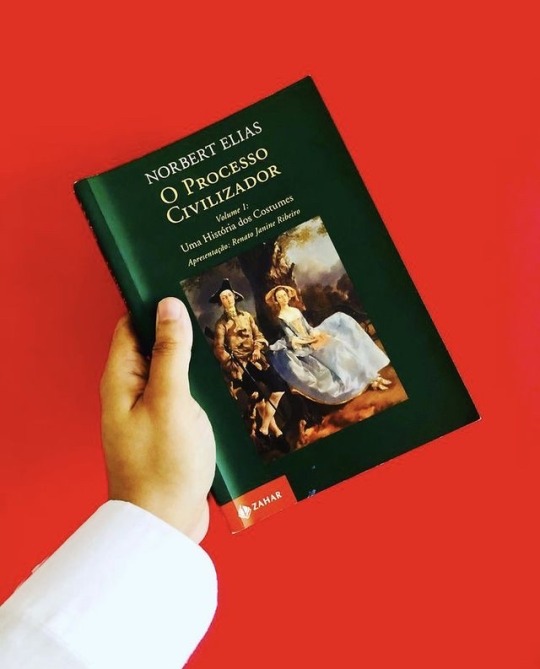
O Processo Civilizador - Volume 1: Uma história dos costumes. ★★★★☆
Foi agradável ler o material de Norbert Elias, estou me referindo ao livro: “O Processo Civilizador” – Volume 1: Uma história dos costumes; foi uma releitura do livro apresentado na época de graduação.
Sempre lembro nas aquisições dos clássicos, desde o início até o término do curso minha realidade permitia acesso de alguns capítulos considerados "essenciais", disponibilizados na gráfica do campus. No post temos um obra escrita em 1939, importante trabalho intelectual de Norbert Elias, correspondendo aos tipos de conexões e traços sociais atrelados aos costumes.
O leitor entrará em contato com outros dois fatores, seguem como; “natureza e cultura”, significativo no campo sociocultural e no decorrer do processo histórico, ou seja, um dos aspectos do autor permanecia em trabalhar com uma história de longa duração.
O livro disponibiliza os variados tipos de adequações sociopolíticas em cada região, seguem outros fenômenos considerados através dos estudos de Norbert, estou referindo aos conceitos de “sociedade e indivíduo”, promovendo análise na dinâmica de interdependência social.
Apesar do livro atender os critérios de qualidade em sua publicação pela editora Zahar, faço uma breve observação, no qual vai de encontro com o entendimento de Norbert Elias.
O livro possui abrangência, não permitindo "engessar" o tema, contém assuntos complexos, e mesmo através do genial nível de exemplificação no estilo de escrita, o leitor precisará de uma dose extra de paciência e profunda reflexão.
@buenoslibrosblog
#bookaddict#books#bookstagram#livros#bookblr#bookstan#literatura#books & libraries#booksbooksbooks#comic books#norbert elias#sociologia#sociology#history#brazil#riodejaneiro#buenoslibrosblog
10 notes
·
View notes
Text
Un libro, breve, ma sempre un libro. È del grande sociologo Norbert Elias. Lo abbiamo pubblicato, come Edizioni Medusa, nel 2010. Curato da Martino Doni. L’illusione del quotidiano. Sociologia con le scarpe slacciate. Questioni di metodo sociologico. Ma non solo. Elias passeggia a Torremolinos, una cittadina andalusa. Ha le scarpe slacciate. Le donne del posto che incontra lo guardano di sottecchi. Alla fine glielo fanno notare con cortesia e partecipazione. Non sia mai che un loro ospite di riguardo inciampi! Il giorno dopo passeggia nuovamente, ma sul corso principale, folto di turisti, e nessuno si occupa dei lacci delle sue scarpe nuovamente penzolanti.
È l’occasione per Elias di ripensare alla distinzione tra Gemeinschaft e Gesellschaft, vale a dire tra comunità e società. Nella prima ci si prende più cura degli altri, nella seconda meno. Elias ripeté l’esperimento in altri luoghi dell’Europa, riscontrando atteggiamenti sempre diversi e fortemente differenziati tra le due polarità, quella dell’indifferenza e quella della sollecitudine. Per non parlare della commiserazione e della compassione. Contano, nell’estensione dell’esperimento, i caratteri nazionali, la dimensione degli ambienti ecc.
Molti dei nostri discorsi si dispongono nella differenza sperimentata da Elias. Ci stanno bene nello spazio aperto delle due categorie che, osservo, potrebbero benissimo considerarsi di comodo, vale a dire utili ad imbastire giudizi sulle caratteristiche salienti del nostro vivere in comune. La maggior parte delle utopie politiche, ma pure solo delle enunciazioni programmatiche, si nutrono di questa differenza, l’hanno alimentata e, spesso, approfondita, scavando un solco incolmabile tra l’aspirazione alla Gemeinschaft e la degradata e degradante Gesellschaft.
Pare oggi del tutto verosimile l’ipotesi concreta di uno spazio sempre più stretto e impraticabile tra le due. Il discorso politico-sociale è sempre e solo in cerca di come distribuire tra i due poli i fenomeni e le aspettative. Si gioca all’annullamento reciproco. E se avessimo bisogno di entrambi?
7 notes
·
View notes
Text
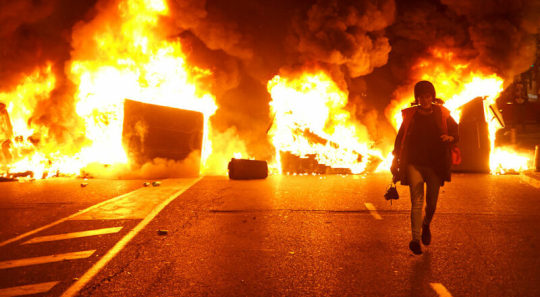
Decivilisation
Decivilisation is the new buzzword. Emmanuel Macron uses it to describe workers who take to the streets, young people in the suburbs or environmental activists. All of Europe’s right-wing parties use the same word to say that Europe is losing its civilisation and is being replaced by barbaric migrants. “By using the term “decivilisation” to describe the increase in violence in France in recent months, Emmanuel Macron is using controversial and contradictory notions to designate what he considers to be a political reality today”.
The word decivilisation is a concept coined by a German sociologist, Norbert Elias, in 1939 to explain how fascists called into question science, intelligence and civilisation in order to appeal solely to people’s emotions and destroy democracy. Fascists burn books and persecute intellectuals with the pseudo-Darwinist argument that we must favour the strong and stop protecting the weak because it is unnatural.
In France, there has been a deliberate effort to decivilise since the 1990s. In 1991, Jacques Chirac justified violence against immigrants because of the noise and smell. (https://www.ina.fr/ina-eclaire-actu/video/s1152333_001/le-bruit-et-l-odeur-de-jacques-chirac). For the first time, a political leader justified behaving like a bully instead of using the rules of society, and he was elected in 1995. In 2005, Nicolas Sarkozy and the kärcher (https://www.ina.fr/ina-eclaire-actu/nicolas-sarkozy-en-2005-le-terme-nettoyer-au-karcher-est-un-terme-qui-s-impose) reduced the inhabitants of the suburbs to filth. It’s dehumanising part of the population. In 2018, the President of the Republic, Emmanuel Macron, says that all you have to do to find a job is cross the street (https://www.rtbf.be/article/je-traverse-la-rue-et-je-vous-trouve-du-travail-jonathan-chomeur-a-mal-digere-les-conseils-de-macron-10022373). When leaders speak in these terms, they are the actors of decivilisation. When they set up illegitimate authorities where the people have no means of expressing themselves, all that’s left is ecoterrorism or street violence. Debate is no longer possible.
There have never been so many disciplinary sanctions in the National Assembly as under Emmanuel Macron’s term of office. Instead of having manners and dignity, elected representatives, from France Insoumise among others, are behaving like savages. The barbarians are those who cry decivilisation. (https://www.lemonde.fr/les-decodeurs/article/2023/07/21/a-l-assemblee-nationale-un-nombre-record-de-sanctions-depuis-la-reelection-d-emmanuel-macron_6182897_4355770.html). The first to encourage the process of decivilisation come from those who are supposed to set an example and implement ways of organising debates to settle differences non-violently. The same thing is happening in all Western democracies. Elected representatives compete in outrageousness and the extreme right applauds and wins the elections. When you set an example of brutality, you restore fear in people, who then look for a protector. Giorgia Meloni claims to protect the people like a mother protects her children (How are women transforming the modern far right? | ARTE Kreatur: https://youtu.be/Z4OUjrHDlQI). In Sweden, the authorities accepted a demonstration by people burning a Koran (https://www.tdg.ch/la-police-autorise-un-rassemblement-qui-prevoit-de-bruler-le-coran-434500290221). In parliaments, members of parliament get into fistfights, make noise to prevent others from speaking, and so on.
If there is no justice and no police to defend him, the citizen must look for a protector who will use force. Politicians have set society on fire by endorsing violence. The first arsonists are those in positions of responsibility. We need rules to protect citizens and not leave it up to the bullies to decide, and we need to put the means in place to achieve this. It is the absence of civilisation that puts us in danger. We need to keep up the barriers that prevent people from behaving like bullies.
“It’s our society, in its toxic relationship with nature and the Other, that is profoundly violent. We spend gigantic sums of money to kill the soil, poison people, impoverish the countries of the South, slaughter billions of animals and drive migrants back into the sea. The Cameroonian historian Achille Mbembe uses the term “necropolitics” to evoke this modern civilisation littered with corpses, where the “methodical administration of death” mobilises science, the army, industry and technology”.(https://reporterre.net/La-decivilisation-est-une-chance).
Decivilisation”: the history of violence (and its political recuperation): https://www.radiofrance.fr/franceculture/podcasts/l-invite-e-des-matins/decivilisation-histoire-de-la-violence-et-de-sa-recuperation-politique-8351283
Decivilisation: where are the barbarians: https://www.radiofrance.fr/franceculture/podcasts/le-billet-politique/le-billet-politique-du-mardi-30-mai-2023-4923294
------------------------------------------------------------------
Ecoterrorism: https://www.aurianneor.org/ecoterrorism/
Illegitimate authorities: https://www.aurianneor.org/illegitimate-authorities/
Police and justice for the people: https://www.aurianneor.org/police-and-justice-for-the-people/
Nos ancêtres les marrons: https://www.aurianneor.org/nos-ancetres-les-marrons-il-nexiste-quune-seule/
La descivilización: https://www.aurianneor.org/la-descivilizacion/
La décivilisation: https://www.aurianneor.org/la-decivilisation/
#aurianneor#decivilisation#democracy#emmanuel macron#europe#far right#fascism#force#France Insoumise#Giorgia Meloni#identity#immigrants#jacques chirac#National Assembly#nicolas sarkozy#Norbert Elias#right#violence
1 note
·
View note
Text
Norbert Elias – Almanlar Üzerine İncelemeler (2023)
Monarşiden Weimar’a, Nazi ülkesinden Federal Almanya’ya uzanan bir hikâye; fantasmaların, incitilmiş yaşamların, körkütük sarhoşlukların ve görülmemiş bir barbarlığın damga vurduğu bir yolculuk.
Öğrenci birliklerinin, Freikorp’ların, SS’lerin ve son olarak Marksist gençlerin seyrini değiştireceği bu yolculuk büyük yenilgiler ve bölünmelerle hafızalara kazınacaktır.
Sosyolojinin kuşkusuz en özgün…

View On WordPress
#19. Yüzyıldan 20. Yüzyıla İktidar Savaşları ve Habitus Gelişimleri#Alfa Yayınları#Almanlar Üzerine İncelemeler#Firuzan Gürbüz Gerhold#Norbert Elias
0 notes
Photo
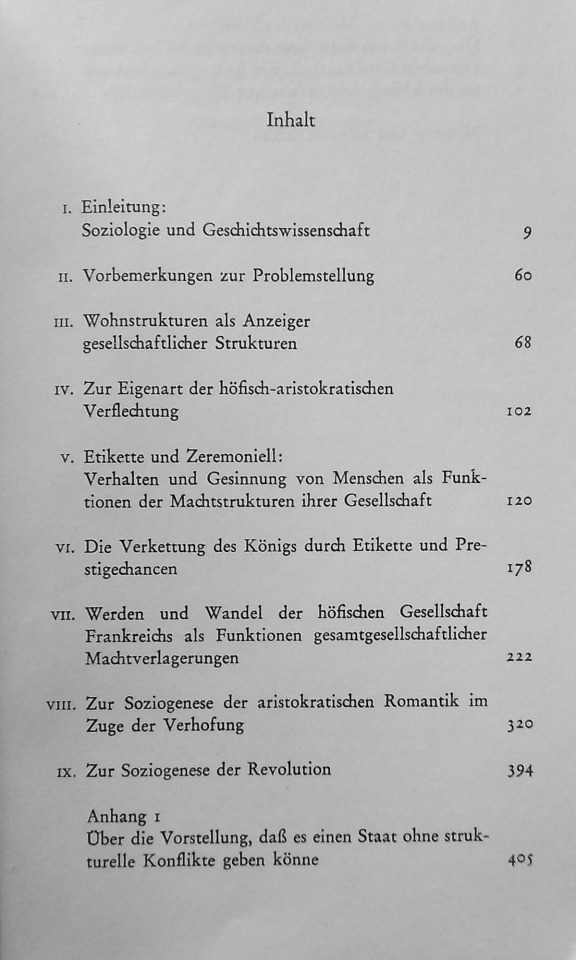
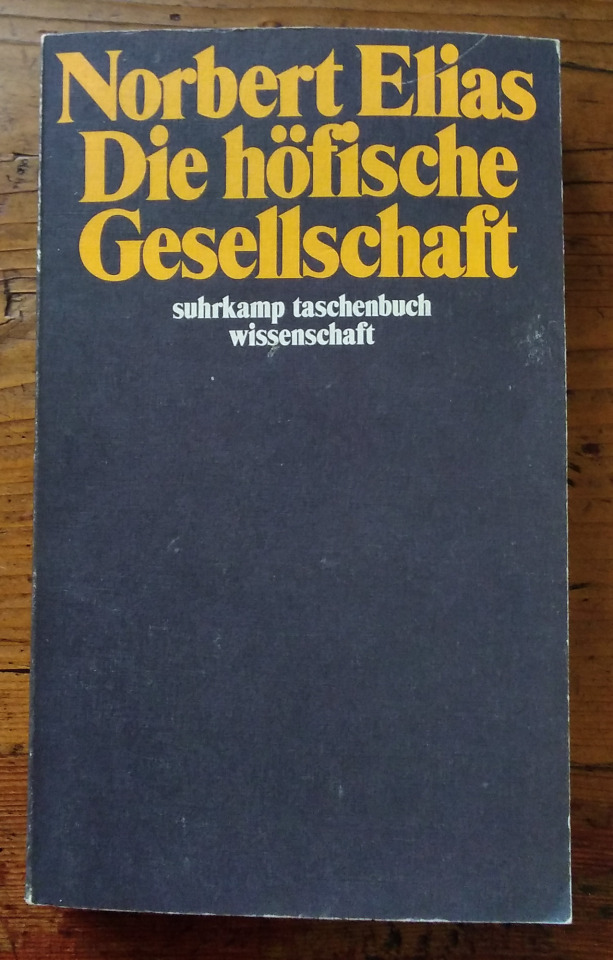
#die höfische gesellschaft#norbert elias#1969#suhrkamp#soziologie#medienwissenschaft#filmgeschäft#prestige
0 notes
Note
do you know any texts on the connection between fascism/the right and cleanliness/hygiene (purity) rhetoric? anything that goes a bit in depth on the topic?
Getting Under Our Skin: The Cultural and Social History of Vermin (2021). Sarasohn, Lisa Tunick. ISBN: 9781421441382
Dirt: New Geographies of Cleanliness and Contamination (2007). Campkin, Ben & Cox, Rosie (Eds.). ISBN: 9781845116729
The Sanitation of Brazil: Nation, State, and Public Health, 1889-1930 (2016). Hochman, Gilberto. ISBN: 9780252099052
Clean and White: A History of Environmental Racism in the United States (2015). Zimring, Carl A. ISBN: 9781479826940
Colonial Pathologies: American Tropical Medicine, Race, and Hygiene in the Phillipines (2006). Anderson, Warwick H. ISBN: 0822338041
Bacteriology in British India: Laboratory Medicine and the Tropics (2017). Chakrabarti, Pratik. ISBN: 9781580465908
The Great Hanoi Rat Hunt: Empire, Disease, and Modernity in French Colonial Vietnam (2018). Vann, Michael G. & Clarke, Liz. ISBN: 9780190602697
Soap and Water: Cleanliness, Dirt and the Working Classes in Victorian and Edwardian Britain (2010). Kelley, Victoria. ISBN: 9781848850521
Contagion: Disease, government, and the “social question” in 19th-century France (1999). Aisenberg, Andrew R.
Rome, Pollution, and Propriety: Dirt, Disease, and Hygiene in the Eternal City from Antiquity to Modernity (2012). Bradley, Mark & Stow, Kenneth R. ISBN: 9781107014435
Sanitizing South Africa: Race, Racism and Germs in the Making of the Apartheid State, 1880-1980 (2015). Fabio Terence Palmi Zoia. PhD. Dissertation, Indiana University. Available from ProQuest Dissertations & Theses Global. (1682266398)
there are also a few theoretical texts in social / cultural anthropology that will be frequent touchstones here, including norbert elias's 'the civilising process' (first published 1939) and mary douglas's 'purity and danger' (1966). i don't honestly think it's worth it or necessary to read these directly, both because they're dated in certain ways and because i think the historical studies are generally more useful. but you will probably notice these two texts & a handful of others repeatedly cropping up in introductory footnotes on this topic.
919 notes
·
View notes
Text
I have thoughts to articulate on how N.Elias's analisys of the (artificial, european) concept of "civilisation" being a natural predecessor to and justification of colonialism Does Not Ever mention the USA because at the time it was still in the middle of its transition into having a national conciousness of "this is the (static, perfect) model of democracy and we should export it everywhere". And now its. yk. been doing that to the detriment of the rest of the world. But I'm notoriously bad at articulating thoughts. Anyways read Norbert Elias and think about the current panopticon-like state of things and what the west did with it 👍for me
#[.txt]#infodump tag#i have a uni course on. kind of exactly this. and I find it deeply interestinggg but I can't put it down correctly enough.#as a guy whose main interest is systems of repression I find Elias's work terribly fascinating. I should read Foucault also.#sorry if this sounds pretentious I am not a knowledgeable person I don't know how to explain my thoughts well. so.#this is all very surface level i'm sure. baby's first thoughts on imperialism or something
14 notes
·
View notes
Note
Ooh, I've been thinking about Mozart lately! I'd love to hear your thoughts/feelings on him if you have anything you'd like to talk about 💜
I mean, talking about music is supposedly like dancing about architecture, and I'm no Nijinsky... and I should clarify that my thesis was specifically about Milos Forman's biopics, i.e. Amadeus and Goya's ghosts... so I guess the good part is that a "fictionalized" Mozart is arguably more appropriate to blorboify 😅
And the truth is I absolutely love Mozart's music, largely thanks to Forman's film. I think it managed to convey the pure genius spot on, not just in showing baby Wolfgang playing flawlessly with his eyes covered or exclamations of how there are no corrections on his sheets (which... I've been to Mizart museum in Vienna. It's freaking true. That guys really wasjust transcribing what was already in his head), but perhaps most in one of my favourite scenes in cinema history, that is Mozart vamping up Salieri's march:
youtube
Just... the moment a... Decent. Good. Better by a mile than what most people will write in their lifetime! piece of music turns into something so purely brilliant that hits something going beyond conscious mind, or culture or history, and just... touches the moment beauty crosses the line of aesthetic and becomes a value in its own right???? AND ALL THAT FROM LISTENING ONCE TO A VERY POOR PERFORMANCE (honestly, tons of ink were spilled for F. Murray Abraham and Tom Hulce, and justly so, but shoutout to Jeffrey Jones for the performance that in one of my better choices of words I described as "majestically unaware of his own mediocrity")???!!!! This explains what pure genius is in a way that no cognitivistics ever could!
(This was one of my major statements in the thesis, btw. One of the biggest questions regarding biopics if you can bend historical facts for a story. And I get how that's a problem, but can you convey the pure genius basing on something that isn't already genius? Because the two "improvised" pieces in Amadeus are both in fact music already written by Mozart, with the "march" being the aria Non piu andrai and the "Bach-like" melody in the party/fart scene is Vivat Bacchus. If you already have a contrast between, again. Decent. Good. and GENIUS, should you really avoid an analysis of what's the difference? Incidentally, neither Shaffer nor Forman say Salieri did in fact murder Mozart)
I think if anyone's looking for someone who did have a Nijinsky skill in writing about Mozart, I really recommend Norbert Elias's Mozart: sociology of a genius. He formulates a sort of sociological look on how genius comes to be. Not so much in a "oh, it's actually all about habitus and people maintaining concepts of beauty to serve their own purposes" or "how to raise a genius" (incidentally, if you're looking for "how NOT to raise a kid" look no further than Leopold Mozart), but really digging into "not denying some unique gift, what social circumstances allow this gift to bloom?"
I just think Mozart's music is the epitome of joyfulness that's profound. It grasps the essential unseriousness of life while keeping its importance to each individual. Makes the everyday into an ideal, without stripping or objectifying anything. It gives a sense of connection that remains thoroughly introspective. It's mathematically perfect while quintessentially human. It is, indeed, how God hears the world.
#am i making any sense here? hope that's somewhat appropriate as an answer...#that last line is taken from Shaffer's play and it's spot on#wolfgang amadeus mozart#mozart#antonio salieri#milos forman#amadeus
10 notes
·
View notes
Text
Global Reading Challenge: 111/200
A personal reading project, where I endeavour to read a book from each of the 193 United Nations member states plus 7 extra* ones. My main goal is to have fun and to learn, but I do have rules for myself:
The book should be fiction, and preferably a novel. I allow plays and poetry, but non-fiction only as the very last resort
The author should have the nationality of their country. If they have lived a good portion of their life there and genuinely represent the local culture, then it's ok if they've been born somewhere else
I want to read books that represent the local literary tradition. Preferably a "classic", a book that illustrates the local culture, or a book that is famous within the country. I avoid popular and contemporary fiction, and books that play outside of the country.
*Extra states have been determined based on UNESCO membership and personal interest where I want to read more books from. This is not a political statement.
The List
Afghanistan: Atiq Rahimi - Earth and Ashes
Albania:
Algeria: Albert Camus - The Stranger (FR)
Andorra: Teresa Colom - Mlle Keaton et autres creatures (FR)
Angola: José Eduardo Agualusa - The Book of Chameleons
Antigua and Barbuda
Argentina: JL Borges - Fictions
Armenia: Raffi - The Fool
Australia: Doris Pilkington/Nugi Garimara - Follow the Rabbit-Proof Fence
Austria
Azerbaijan
Bahamas: Telcine Turner - Woman Take Two
Bahrain
Bangladesh
Barbados
Belarus: Uladzimir Karatkievich - King Stakh's Wild Hunt
Belgium
Belize: Zee Edgell - Beka Lamb
Benin
Bhutan
Bolivia
Bosnia and Herzegovina
Botswana: Bessie Head - Maru
Brazil: Paulo Coehlo - The Alchimist
Brunei Darussalam: K.H. Lim - Written in Black
Bulgaria: Elias Canetti - Komödie der Eitelkeit (GER)
Burkina Faso: Norbert Zongo - Le parachutage (FR)
Burundi: Samoya Kirura - La femme au regard triste (FR)
Cabo Verde: Germano Almeida - The Last Will & Testament of Senhor da Silva Araújo
Cambodia
Cameroon: Francis Bebey - King Albert
Canada: S. Alice Callahan - Wynema: A Child of the Forest
Central African Republic: Étienne Goyémidé - Le dernier Survivant de la caravane
Chad: Told by Starlight in Chad - Joseph Brahmin Seid
Chile
China
Colombia
Comoros: Ali Zamir - A Girl Called Eel
Congo
Cook Islands*: Kauraka Kauraka- Oral tradition in Manihiki
Costa Rica: Carlos Luis Fallas - Mamita Yunai (Die Grüne Hölle, GER)
Côte D’Ivoire
Croatia
Cuba
Cyprus: Kyriakos Charalambides - Selected Poems
Czech Republic: Jan Neruda - Prague Tales
DPRK (North Korea)
DRC
Denmark
Djibouti
Dominica: Jean Rhys - Wide Sargasso Sea
Dominican Republic
Ecuador
Egypt
El Salvador: Horacio Castellanos Moyà - Le bal des vipères (FR)
Equatorial Guinea: Trifonia Melibea Obono - La Bâtarde (FR)
Eritrea: Helen Berhane - Song of the Nightingale
Estonia
Eswatini: Malla Nunn - A Beautiful Place to Die
Ethiopia
Fiji: Rajni Mala Khelawan - Kalyana
Finland
France: Pierre Louys - Aphrodite: Ancient Manners
Gabon: Daniel M Mengara - Mema
Gambia
Georgia
Germany: Thomas Mann - Buddenbrooks
Ghana: Ayi Kwei Armah - The beautiful ones are not yet born
Greece
Greenland*: Knud Rasmussen - Eskimo Folktales
Grenada: Merle Collins - The Colour of Forgetting
Guatemala: Miguel Angel Asturias - Strong Wind
Guinea: Camara Laye - The Radiance of the King
Guinea Bissau: Abdulai Sila - The ultimate tragedy
Guyana Haiti
Honduras: Froylan Turcios - El Vampiro (SPA)
Hungary: Arthur Koestler - Darkness at Noon
Iceland
India: Rabindranath Tangore - The Home and the World
Indonesia
Iran: Sadegh Hedayat - The Blind Owl
Iraq: Andrew George - The epic of Gilgamesh
Ireland: James Joyce - Dubliners
Israel
Italy: Italo Calvino - If on a Winter's Night a Traveller
Jamaica: Andrew Salkey - Hurricane
Japan
Jordan: Amjad Nasser - L'ascension de l'amant (FR)
Kazakhstan
Kenya
Kiribati: Teresia Teaiwa & Vilsoni Hereniko - Last Virgin in paradise
Kosovo*
Kuwait
Kyrgyzstan: Chingiz Aitmatov - Jamila
Laos: Outhine Bounyavong - Mother's Beloved
Latvia
Lebanon
Lesotho
Liberia: Bai T. Moore - Murder in the Cassava Patch
Libya
Liechtenstein
Lithuania: Vingas Kreve - The Herdsman and the Linden Tree
Luxembourg: Norbert Jacques - Dr Mabuse der Spieler (GER)
Madagascar: Jean-Joseph Rabearivelo - Traduit de La nuit (FR)
Malawi
Malaysia
Maldives: Abdullah Sadiq - Dhon Hiyala and Ali Fulhu
Mali
Malta
Marshall Islands: Kathy Jetnil-Kijiner - Iep Jaltok: Poems from a Marshallese Daughter
Mauritania: Moussa Ould Ebnou - L'Amour Impossible (FR)
Mauritius
Mexico: Mario Bellatín - Beauty Salon
Micronesia: Emelihter Klieng - My Urohs
Monaco: Louis Notari - La légende de Sainte Dévote (FR)
Mongolia: Galsan Tschinag - Die Karawane (GER)
Montenegro: Petar II Petrovic Njegos - The Mountain Wreath
Morocco: Abdellatif Laâbi - Le bâpteme chacaliste (FR)
Mozambique
Myanmar
Namibia
Nauru: Nancy Viviani - Nauru, phosphate and political progress
Nepal
Netherlands
New Zealand: Witi Ihimaera - The Whale Rider
Nicaragua: Rubén Dario - Azul… (SPA/ENG)
Niger
Nigeria: Chinua Achebe - Things Fall Apart
Niue*: John Puhiatau Pule - The Bond of Time: An Epic Love Poem
North Macedonia
Norway: Henrik Ibsen - A Doll's House
Oman
Pakistan: Jamil Ahmad - The Wandering Falcon
Palau: Hermana Ramarui - The Palauan Perspective: a poetry book
Panama: Ricardo Miró - Las Noches de Babel (SPA)
Palestine*: Ibrahim Nasrallah - Prairies of Fever
Papua New Guinea: Vincent Eri - The Crocodile
Paraguay
Peru: Mario Vargas Llosa - In Praise of the Stepmother
Philippines
Poland: Isaac Singer - The Magician of Lublin
Portugal
Qatar
Republic of Korea
Republic of Moldova
Romania: Ioan Slavici - The lucky mill
Russian Federation: Leo Tolstoi - The Death of Ivan Ilyich
Rwanda
Saint Kitts and Nevis: Caryl Philips - Cambridge
Saint Lucia: Derek Walcott - Omeros
Saint Vincent and the Grenadines
Samoa: Albert Wendt - Leaves of the Banyan Tree
San Marino: J. Theodore Bent - A freak of Freedom: or, the Republic of San Marino
Sao Tome and Principe:
Saudi Arabia
Senegal
Serbia
Seychelles: Antoine Abel - Coco Sec (FR)
Sierra Leone
Singapore
Slovakia: Milan Rúfus - Strenges Brot
Slovenia: France Prešeren - Poems
Solomon Islands: John Saunana - Cruising Through the Reverie
Somalia: Hadraawi - The Poet and the Man
South Africa: JM Coetzee - Disgrace
South Sudan: Nyuol Lueth Tong - There is a country
Spain: Miguel de Unamuno - Abel Sanchez and Other Stories
Sri Lanka
Sudan
Suriname
Sweden: August Strindberg - The Red Room
Switzerland
Syrian Arab Republic: Ibn al-Nafis - Theologus Autodidactus
Taiwan*
Tajikistan: Shavkat Niyazi - At the Foot of Blue Mountains: Stories by Tajik Authors
Thailand
Timor-Leste: Xanana Gusmão - Mar Meu
Togo
Tonga: Epeli Hau'ofa - Tales of the Tikongs
Trinidad and Tobago
Tunisia: Albert Memmi - The Pillar of Salt
Turkey
Turkmenistan: Magtymguly - Poems from Turkmenistan
Tuvalu: Neil Lifuka - Logs in the current of the sea
Uganda: Okot p'Bitek - Song of Lawino & Song of Ocol
Ukraine: Andrey Kurkov - Death and the Penguin
United Arab Emirates
UK: Virginia Woolf - Mrs Dalloway
United Republic of Tanzania
USA: John Steinbeck - Grapes of Wrath
Uruguay
Uzbekistan: Abdullah Qoqiriy - Bygone Days
Vanuatu: Grace Molisa - Black Stone
Vatican City*: Andrew Graham-Dixon - Michelangelo and the Sistine Chapel
Venezuela
Viet Nam
Yemen: Abdul-wali - They die strangers
Zambia
Zimbabwe
#booklr#currently reading#reading challenge#classic literature#literature#books#book recommendations#global reading#Sam reads#PLEASE let me know if the Read More breaks since this is a very longue post#I will link to my book reviews of the books I've read when I post them!!!
24 notes
·
View notes
Note
As an aspiring anthro masters guy (gender neutral) who is currently doing a thesis on Dracula and the outsider theory by Norbert Elias, I am so glad there's other academic people who are silly serious about vampires and creatures and mcr. I love this podcast very dearly <3
holy WOW. we would love to read that. SO COOL.
we love you & ur support means so much to us <333
7 notes
·
View notes
Text
Eric Wolf

Wolf and his mother in 1925, via the Ghani AE interview
Eric Wolf was born in Austria in 1923, the son of an Austrian father and a Russian mother. The family was Jewish but hardly religious: His father was a textile designer and freemason, his mother a Harbin-born liberated woman who aspired to be a doctor and "talked rather admiringly of what was going on in the Soviet Union" (Ghani interview). Wolf spent his early years in Vienna, and then he moved to the Sudetenland (now the Czech republic) when his father sent to improve productivity at one of his company's textile factories there. When the Nazis took over Austria in 1938 the Wolfs knew Sudetenland would be next, and they fled for England, settling in Essex. (timeline, NAS obit, wolf on Elias)
In 1940, Germany invaded France and the English realized war would come to them. They responded by rounding up immigrant German families and interning them. Wolf's family was sent off to detention camps at Huyten, near Liverpool (). The camps were hardly full of Nazi sympathizers ready to sabotage England's factories -- just the opposite, in fact. Wolf found himself interned with all of the communists and socialists who had fled the Nazis. The organized camp activities, including lecture series (this was before Tiktok when people arranged lecture series when they were bored). As a result, the camp was Wolf's political awakening. He read CLR James and listened to lectures by Norbert Elias, developing left wing and Marxist sympathies.
Wolf's family was eventually released, and immigrated to New York, where they had family. Their boat, the Scythia, arrived in Ellis Island on 7 July 1940 when Wolf was 17 (ancestry). He and his family settled in Jackson Heights, Queens. (NAS) (Elias). Wolf had grown interested in science and nature when he was a student at The Forrest School in Essex (Ghani interview), and continued these studies at Queens College CUNY.

Wolf getting a haircut at Camp Hale in 1944, via the Ghani AE interview
Wolf did not finish his studies before he was called back to Europe -- this time as a soldier. He enlisted in the army on 12 March 1943 to fight the fascism he had fled from just a few years before (Tumblr). He was 19 years old, 5'9" and weighted 149 pounds. For reasons I don't yet understand, he was sent off to Camp Hale to become part of the famous 10th Mountain Division (he was 35th regiment, H company) (10th Mountain Name Index). This unit, originally formed by expert skiers, would have a unique and prestigious history. It included many men who would go on to develop skiing as recreation in the US, as well as Bill Bowerman (found of Nike and inventor of the waffle-soled running shoe), and future politician Bob Dole, who was soon to be almost mortally wounded. More recently, the 10th has served with distinction in Iraq and Afghanistan. Wolf was training was rigorous -- he was taught to ski, climb mountains, and conduct warfare in frigid mountain conditions. Those soldiers you see in movies who pop up out of the snow in white uniforms to ambush people? That was Wolf.
Wolf's division played an important part in the liberation of Italy. It arrived on the peninsula in January 1945. The allied army had spent the better part of two years advancing up the Italian peninsula but has stalled south of the Apennines, where the German 'Gothic Line' held them back. The Fifth Army needed to cross through a mountain pass to take Bologna, but German artillery on the high ground made the road impassible. Wolf's regiment ascended to the mountains behind the German position and encircled them, providing artillery support to the other regiments in the 10th as they took the German positions. Not expected to be surrounded on a mountain top in the middle of the winter, the Germans were defeated.
From there Wolf's division pursued retreating German forces across the Po valley, into upper Lombardy, and up into the Southern Tyrols around Lake Garda, an area he had once vacationed in as a child (Hidden Frontier, 4). In May 1945 the Italian army surrendered, and by July Wolf was being shipped out for an even more difficult assignment -- the invasion of Japan. The US bombed Hiroshima and Nagasaki while his division was in transit across the Atlantic. Wolf arrived in New York Harbor in 11 August and four day later Japan surrendered. On VJ day he found himself in his home town with a month's furlough and a lot of celebration to do. His service officially ended in 30 Nov 1945. (10th mountain chronology)
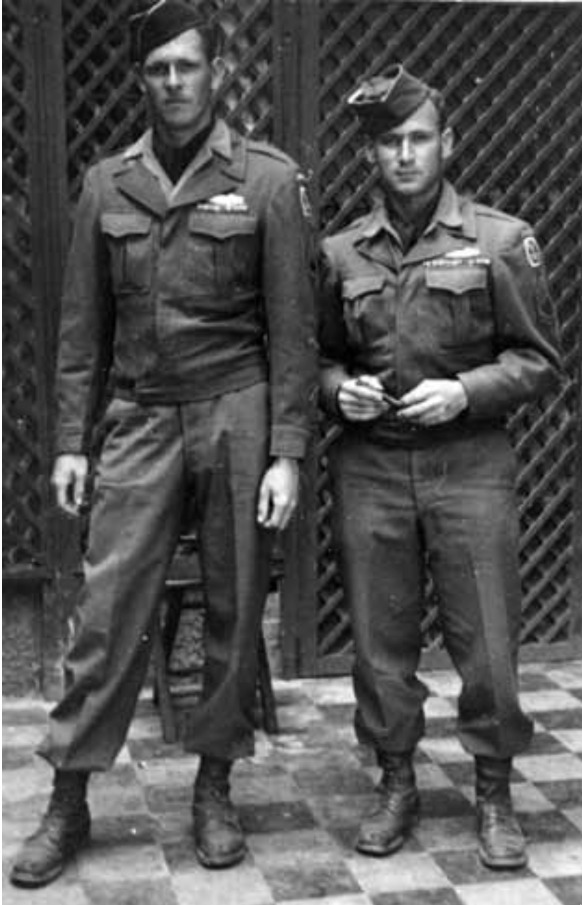
Wolf (right) in Italy with a buddy, NAS obit
After the war Wolf returned to New York and used GI Bill money to finish his degree at Queens in 1946 (NAS obit). It appears that he fell under the influence of Hortense Powdermaker there, and then went on to Columbia to study anthropology.
Wolf encountered Columbia in its first years without Boas. He was influenced by Ruth Benedict, and interviewed Tyrolese as part of her Research in Contemporary Cultures project (Hidden Frontier 5). A more important influence, however, was Julian Steward, a Berkeley grad and protégé of Alfred Kroeber and Robert Lowie. Steward was politically conservative and interested in natural history and evolution. He ran a large program called the 'People of Puerto Rico' project to examine how different crops in Puerto Rico such as coffee and cotton shaped life in areas where they were grown. Wolf got his Ph.D. in 1951 studying coffee plantations on the western side of the island. He thus developed an interest in political economy and Latin America.
Even more important than his formal teachers were Wolf's colleagues. He became part of a circle of similarly minded male veterans who identified at part of the 'MUS' or Mundial Upheaval Society -- the jokingly serious name of the reading group they all participated in. This group included Robert Murphy, Morton Fried, Syndey Mintz, Robert Manners, and others.

Wolf in 1943 -- this is why he would have looked like during his time at Columbia, NAS obit
Wolf spend most of the 1950s teaching at a variety of short-term positions (UIUC, Virginia, Yale, and Chicago). It was during this period that he did fieldwork in Mexico. He also married a social worker named Kathleen 'Katia' Bakeman and began conducting research in Mexico. Eventually, in 1961 he settled down to a permanent position at Michigan, a place where his 'evolution and revolution' brand of anthropology was welcome. (NAS obit 5).
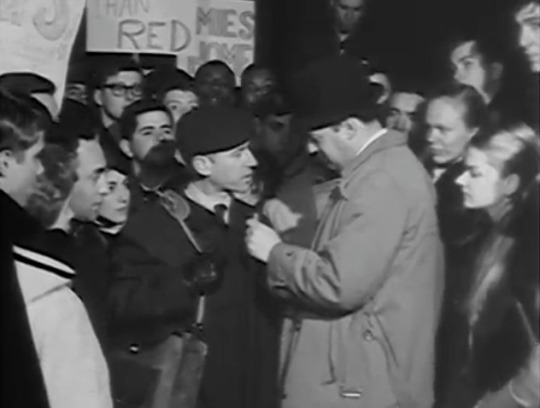
Eric Wolf wearing a beret, on the left, being interviewed during a protest against the Vietnam War. Via the University of Michigan.
At Michigan he also became increasingly politically active. The main target of his ire was the Vietnam war. He helped to organize the first teach-in, and also became active in AAA politics, opposing those who thought anthropologists should help the US defeat the Viet Cong.
During his time at Michigan Wolf returned to the Alps, this time to do fieldwork alongside his student John Cole.

Wolf, with son David, during a 1960-61 fieldwork trip in the Italian Alps, via the NAS obit
1971 was a key year in Wolf's life. He left Michigan for the Grad Center at CUNY, where he was to remain for the rest of his life. He also left his wife, who remarried another Michigan anthropology professor -- 1971 was a popular year for divorces -- and married Sydel Silverman, an anthropologist of the Italian alps whose previous husband had died of cancer a few years before. Wolf became a father to Silverman's children and the couple had children of their own, becoming a single happy family. Silverman is best remembered today as the long-time head of the Wenner-Gren foundation. In 1974 Cole and Wolf produced their volume on the Italian alps, The Hidden Frontier. Wolf dedicated it to his first wife.

Wolf with Sydel Silverman
Throughout the 1970s Wolf's intellectual ambition broadened beyond Europe and Latin America, and in 1982 Wolf's magnum opus, Europe and the People Without History, was published. In 1990 he won a MacArthur. He retired in 1992 and died in 1999.
17 notes
·
View notes
Text
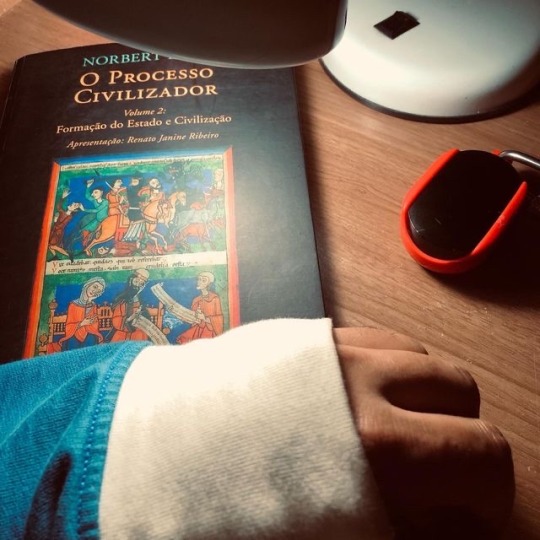
O Processo Civilizador - Volume 2: Formação do Estado e Civilização. ★★★★☆
Acredito no potencial dos clássicos, e fico feliz pela experiência de leitura nos dois volumes de “Processo Civilizador”, publicados pela Editora Zahar. Posso assegurar aos admiradores de humanas, é muito satisfatório ler os trabalhos de Norbert Elias. Nesta postagem, sigo tratando do “material” que teve sua publicação original em 1939, uma verdadeira obra prima, digna em ocupar “lugar” ao lado de tantos outros trabalhos realizados pelos “imortais” da sociologia.
No segundo livro de “O Processo Civilizador – Formação do Estado e Civilização”; obtive uma experiência literária densa, foi necessário recorrer ao material de apoio. Não é o tipo de obra sociológica que exige uma breve leitura, o livro contém bastante notas de rodapé, possivelmente farei uma releitura.
O autor organizou uma pesquisa “milimetricamente” nas questões socioeconômicas e seus desencadeamentos nos aspectos socioculturais; deixando evidente no “recorte histórico” uma mudança comportamental mediante poderes territoriais, influências, disputas nas sucessões dos controles em diversas casas de guerreiros localizados na região franca do ocidente e desintegração dos vínculos feudais.
Deixando também evidente distinções nas representações do feudalismo senhorial pós-carolíngio e o principesco, realizou importantes apontamentos na transição histórica, na busca incessante do poder entre “diversas casas”, onde teriam como objetivo o monopólio do vencedor.
Mesmo através das fortes influências dos descendentes dos Capeto, não ocorreu uma concentração definitiva nas regiões “monopolizadas”, sendo determinando apenas como um “próximo passo” (ainda existindo, mesmo de forma reduzida, articulações conspiratórias, consequências de competições) ao caminho de uma monarquia absoluta.
Em todo momento, Norbert Elias utiliza uma linha de pesquisa comparativa entre Alemanha, Inglaterra e França. O leitor perceberá que mesmo no “pós-transição” feudal, o autor menciona magistralmente, ainda em sua composição sociológica os efeitos nas correlações de poderes nas mãos dos burgueses e absorção cultura herdados da sociedade de corte. Recorrendo aos recursos na autonomia da violência e transformação social na formação do Estado-Nação.
Fechando minhas conclusões sobre o livro, vejo que tenho vontade em realizar uma releitura e aprofundamento em outras fontes fontes que trabalham sobre o tema. Não posso dizer que o livro contém um entendimento inalcançável, isso fica de acordo com cada leitor e sua “bagagem de conhecimento”. Tenho vontade de fazer ainda aquisições de três outras obras de Norbert Elias; A Sociedade de Corte, A Sociedade dos Indivíduos e Os Alemães.
@buenoslibrosblog
#bookaddict#books#bookstagram#livros#bookblr#bookstan#literatura#books & libraries#booksbooksbooks#comic books#booklr#brazil#história#history#buenoslibrosblog#Norbert Elias#riodejaneiro#brasil#literature#goodreads#livroeleitura#editorazahar#zahareditora#zahar
1 note
·
View note
Text
Manners books have supplied the sociologist Norbert Elias with data upon which he has built a coherent theory of the development of Western inhibitions since the Renaissance. Elias claims that at that point—specifically from 1530, the date at which Erasmus published his short treatise on manners, which he called de civilitate morum puerilium (On the Civility of the Behaviour of Boys)—momentous changes began in our history.
The medieval concept of manners, called “courtesy” because it was practised by noblemen at court, begins to be called “civility,” a term for a wholly new system of bodily propriety, which is henceforth applicable to all citizens, not merely the elite. “Civility” governs far more behaviour than table manners. The seven chapters of Erasmus’s treatise concern body posture and facial expression, dress, behaviour in church, table manners, conversation, and comportment at play and in the bedroom.
From this point onwards, Elias claims, bodily functions came to be displayed in public less and less. People began to refrain in company from belching, farting, excretion, and spitting. Eventually, even speaking and writing about these things (Erasmus had been quite unembarrassed about mentioning them) was to be banned in polite society.
As Elias puts it, “walls” of restraint and embarrassment grew up between people; where once dinner was handled by the whole group, and cutlery, dishes, and goblets passed about for all to use, now each person had his or her own implements. As time went on it was insisted that no one touch even his own food with his hands except in certain specific cases, and postures were devised which would make even brushing against another person at table as unlikely as possible.
The new manners—both the formal rules of protocol and precedence and the unspoken, more profoundly enculturated rules like table manners—were seen increasingly, according to Elias, as ways in which one did not offend other people. You were controlling yourself, so as to prevent other people from being disgusted or “shocked.” People lived very closely together at Versailles; everyone was watched by everyone else, and actual physical proximity helped raise some of the new sensitivity to other people’s real or imagined susceptibilities.
Men were expected on the whole to give up physical force as a means of getting their way, and—as always when “the graces” are preferred over brute strength—women began to count for more.
Within the aristocratic court circle, people became, in spite of the obsession with rank, far more equal. Secure in the knowledge that just being at court was the pinnacle of prestige, from which most of society was shut out, courtiers could permit themselves to respect each other.
As the bourgeoisie became richer and more indispensable even at court, they demanded—and were given, by self-appointed experts who wrote manuals for them—instruction in how to behave as people did in “the best circles.” In 1672, Antoine de Courtin produced Nouveau traité de la civilité qui se pratique en France parmi les honnestes gens (The New Treatise of the Civility Which Is Practised in France Among Honest People). (“ Honest”—honnête—kept its original association with honour and the opposite-but-supporting notion, shame.)
Where cutlery, dishes, and seating arrangements are concerned, manners in the West have changed in significant respects—although only very slowly, as in the case of the adoption of the fork.
But the old ways, of eating with the fingers and sharing the drinking vessel, involved manners, too—manners particular to those ways of eating and drinking. The careful rules governing those old ways became obsolete as the new implements took over and demanded (as well as being created for) new ways of behaving. The counsel that people should not scratch themselves at table, for instance, becomes less common as access to soap and hot water reduces the discomfort at the root of the habit. In other words technological change, brought about in part by demands for increased physical protection and isolation from other people, in turn forces up the barriers and standards that structure our most intimately personal choices.
#book: the rituals of dinner#16th century#17th century#etiquette#good manners#kitchenware#culture#courtesy#middle ages#technology
1 note
·
View note
Text
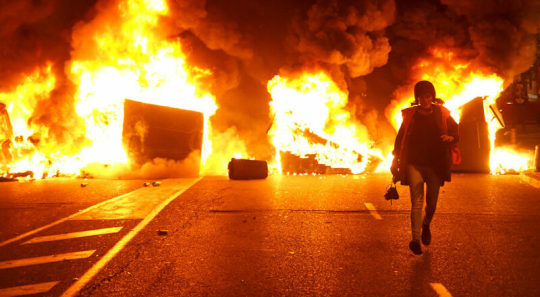
La descivilización
La descivilización es la nueva palabra de moda. Emmanuel Macron la utiliza para describir a los trabajadores que salen a la calle, a los jóvenes de los suburbios o a los activistas medioambientales de las zonas de defensa. Todos los partidos de derecha europeos utilizan la misma palabra para decir que Europa está perdiendo su civilización y está siendo sustituida por migrantes bárbaros. “Al utilizar el término “decivilización” para describir el aumento de la violencia en Francia en los últimos meses, Emmanuel Macron utiliza nociones controvertidas y contradictorias para designar lo que considera una realidad política actual”.
La palabra descivilización es un concepto acuñado por un sociólogo alemán, Norbert Elias, en 1939 para explicar cómo los fascistas ponían en tela de juicio la ciencia, la inteligencia y la civilización para apelar únicamente a las emociones de la gente y destruir la democracia. Los fascistas queman libros y persiguen a los intelectuales con el argumento pseudodarwinista de que hay que favorecer a los fuertes y dejar de proteger a los débiles porque es antinatural.
En Francia, desde los años noventa se está llevando a cabo un esfuerzo deliberado de descivilización. En 1991, Jacques Chirac justificó la violencia contra los inmigrantes por el ruido y el olor. (https://www.ina.fr/ina-eclaire-actu/video/s1152333_001/le-bruit-et-l-odeur-de-jacques-chirac). Por primera vez, un dirigente político justificaba comportarse como un abusador en lugar de utilizar las reglas de la sociedad, y fue elegido en 1995. En 2005, Nicolas Sarkozy y la kärcher (https://www.ina.fr/ina-eclaire-actu/nicolas-sarkozy-en-2005-le-terme-nettoyer-au-karcher-est-un-terme-qui-s-impose) redujeron a los habitantes de los suburbios a basura. Deshumaniza a una parte de la población. En 2018, el presidente de la República, Emmanuel Macron, dice que para encontrar trabajo basta con cruzar la calle (https://www.rtbf.be/article/je-traverse-la-rue-et-je-vous-trouve-du-travail-jonathan-chomeur-a-mal-digere-les-conseils-de-macron-10022373). Cuando los dirigentes hablan en estos términos, son los actores de la descivilización. Cuando instauran autoridades ilegítimas en las que el pueblo no tiene medios para expresarse, sólo queda el ecoterrorismo o la violencia callejera. El debate ya no es posible.
Nunca ha habido tantas sanciones disciplinarias en la Asamblea Nacional como bajo el mandato de Emmanuel Macron. En lugar de tener modales y dignidad, los representantes electos, de France Insoumise entre otros, se comportan como salvajes. Los bárbaros son los que gritan “decivilización”. (https://www.lemonde.fr/les-decodeurs/article/2023/07/21/a-l-assemblee-nationale-un-nombre-record-de-sanctions-depuis-la-reelection-d-emmanuel-macron_6182897_4355770.html). Los primeros en alentar el proceso de descivilización proceden de quienes se supone que deben dar ejemplo y poner en práctica formas de organizar los debates para resolver las diferencias sin violencia. Lo mismo ocurre en todas las democracias occidentales. Los representantes elegidos compiten en atrocidades y la extrema derecha aplaude y gana las elecciones. Cuando se da ejemplo de brutalidad, se restablece el miedo en la gente, que entonces busca un protector. Giorgia Meloni afirma proteger a la gente como una madre protege a sus hijos (¿Cómo están transformando las mujeres la extrema derecha moderna? | ARTE Kreatur: https://youtu.be/Z4OUjrHDlQI). En Suecia, las autoridades aceptaron una manifestación de personas que quemaban un Corán (https://www.tdg.ch/la-police-autorise-un-rassemblement-qui-prevoit-de-bruler-le-coran-434500290221). En los parlamentos, los diputados se lían a puñetazos, hacen ruido para impedir que otros hablen, etcétera.
Si no hay justicia ni policía que le defienda, el ciudadano debe buscar un protector que utilice la fuerza. Los políticos han incendiado la sociedad avalando la violencia. Los primeros incendiarios son los que ocupan puestos de responsabilidad. Necesitamos normas para proteger a los ciudadanos y no dejar que los acosadores decidan, y debemos poner los medios para lograrlo. Es la ausencia de civilización lo que nos pone en peligro. Tenemos que mantener las barreras que impiden que la gente se comporte como intimidadores.
“Es nuestra sociedad, en su relación tóxica con la naturaleza y el Otro, la que es profundamente violenta. Gastamos gigantescas sumas de dinero para matar el suelo, envenenar a la gente, empobrecer a los países del Sur, sacrificar miles de millones de animales y expulsar a los emigrantes al mar. El historiador camerunés Achille Mbembe utiliza el término “necropolítica” para evocar esta civilización moderna sembrada de cadáveres, donde la “administración metódica de la muerte” moviliza la ciencia, el ejército, la industria y la tecnología”. (https://reporterre.net/La-decivilisation-est-une-chance).
Décivilisation” : histoire de la violence (et de sa récupération politique): https://www.radiofrance.fr/franceculture/podcasts/l-invite-e-des-matins/decivilisation-histoire-de-la-violence-et-de-sa-recuperation-politique-8351283
“Décivilisation” : où sont les barbares ?: https://www.radiofrance.fr/franceculture/podcasts/le-billet-politique/le-billet-politique-du-mardi-30-mai-2023-4923294
#Asamblea Nacional#aurianneor#democracia#derecha#descivilización#emmanuel macron#europa#extrema derecha#fascismo#France Insoumise#fuerza#Giorgia Meloni#identidad#inmigrantes#jacques chirac#nicolas sarkozy#Norbert Elias
1 note
·
View note
Text
Norbert Elias – Ölmekte Olanların Yalnızlığı Üzerine (2023)
Norbert Elias, bu küçük kitabında başyapıtı ‘Uygarlık Süreci’nin izini sürüyor aslında.
Uygarlık sürecinin özgül ve zorlu, soğuk bir yüzüne, ölme deneyimine eğiliyor.
Elias, ölümün toplumsal tarihinin bir klasiğini, Philippe Ariès’i eleştiriyor öncelikle.
Onun, “geçmiş zamanlarda insanların huzur ve sükûnetle öldükleri” varsayımını sorguluyor.
Elias’a göre modernleşme ve uygarlaşma sürecinin…
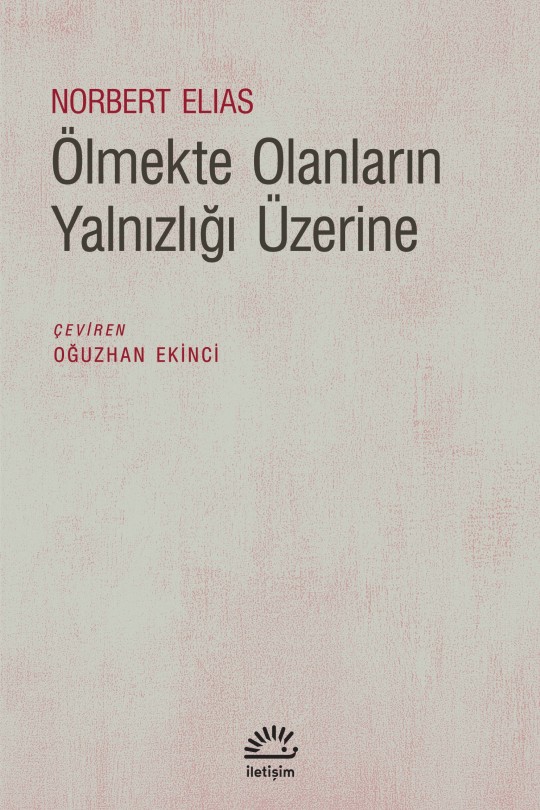
View On WordPress
0 notes
Text
Cont. to read Dirty Work
Ch. 3 Prisons have always been geographically isolated and visually lackluster, I assumed after these visits, the better to avoid attracting unwanted attention from outsiders. As I subsequently learned, this assumption was wrong. During the Jacksonian era, “Americans took enormous pride in their prisons, were eager to show them off to European visitors, and boasted that the United States had ushered in a new era in the history of crime and punishment,” notes the historian David Rothman.
Among the visitors invited to see the early prisons of the new republic was Charles Dickens, who toured the grounds of Pennsylvania’s Eastern State Penitentiary in 1842, chatting freely with convicts as he passed from cell to cell. “Nothing was concealed or hidden from my view,” Dickens wrote in his American Notes, “and every piece of information that I sought, was openly and frankly given.” In both America and England, prisons in the nineteenth century tended to be built in prominent places that were exposed to the public. Some boasted soaring turrets and stone arcades and were likened to palaces.
At the time, America’s penal system was shaped by a belief that prisons could be designed to foster moral uplift and turn chastened offenders into law-abiding citizens. By the 1980s, a more punitive philosophy had taken hold, which made prison administrators and public officials all the more inclined to limit access to their grounds.
But the shift to the margins of society could also be attributed to something else. In Pratt’s view, it reflected the triumph of “civilized punishment”—civilized not in the conventional meaning of the term, but in the sense that Norbert Elias described, whereby distasteful and disturbing events were removed from sight and pushed “behind the scenes of social life.”
...In Discipline and Punish, Michel Foucault argued that the transition to the more refined technologies of punishment in the modern era—most notably, the prison—was driven by the desire to control and observe the bodies of criminals, rendering them docile and obedient. Criminologists influenced by Elias have emphasized another rationale, arguing that the shift was propelled by a desire to hide these bodies from respectable citizens who no longer wanted to glimpse the sordid business of punishment with their own eyes.
The fact that corporal punishment came to be viewed as sordid was, in theory, a sign of progress. Yet as Elias’s disciples have noted, the “civilizing process” he outlined did not suggest that brutal violence would cease, only that it would be relegated to more private spaces. According to the scholar David Garland, who introduced Elias’s work to the sociology of punishment, violence would not offend civilized sensibilities so long as it unfolded behind closed doors or could be sanitized.
...Flogging prisoners clearly violated the “threshold of repugnance” among modern Americans. But caging them in hidden, segregated “isolation units” did not. The fact that solitary confinement’s “ghastly signs and tokens are not so palpable to the eye,” as Dickens had observed in 1842, was precisely why so many people failed to find it offensive. “Routine violence and suffering can be tolerated on condition that it is discreet, disguised, or somehow removed from view,” observed Garland. What mattered was not the level of brutality, but its visibility and form. Viewed in this light, the remoteness of Florida’s prisons was not an accident. Throughout the Western world, “the civilized prison became the invisible prison,” Pratt observed, hiding the system’s violence and making it that much easier for “good people” to ignore or forget about what was happening behind the walls.
1 note
·
View note